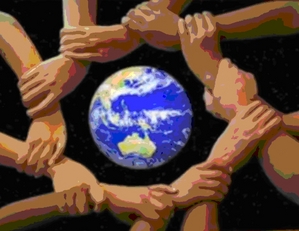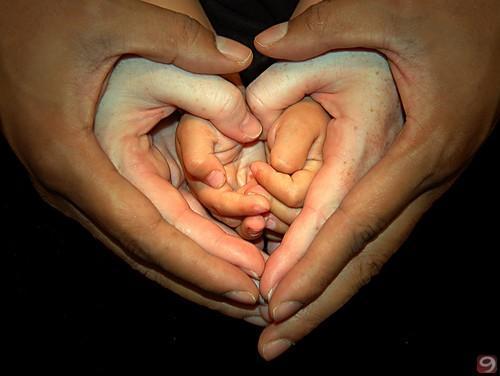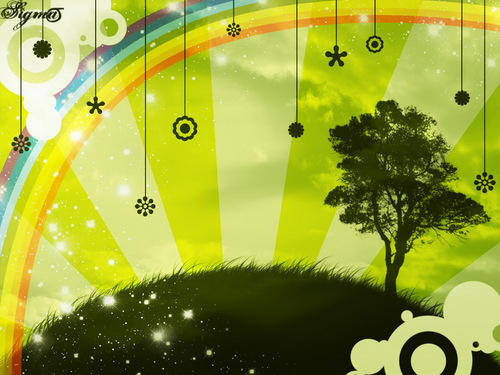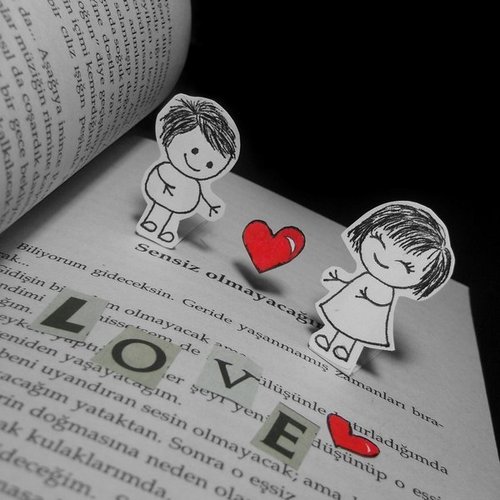A Little Story
About
The Sense of Belonging
Because I live in the country, I have to drive along a few backroads before I reach the highway that takes me to work. These tranquil roads are often a little slow. One beautiful summer morning, I find myself behind a man on a tractor. Every twenty یا thirty meters, he stops to chat with someone. I cannot overtake him on such a narrow, winding road. The conversations only take a few سیکنڈ – the time to say hello and exchange news – but they are enough to make me nervous. I don’t know what he could be talking about with the people he meets at the roadside, but clearly it is nothing urgent. And here am I behind him, in a hurry to get to work, fuming as I wait for this man to finish his conversation. I cannot toot the horn (here that would be considered rude – یا an act of lunacy). All I can do is wait, and churn out angry thoughts.
Then suddenly I realize what is going on: it is not anger I feel, but envy. This person in front of me, with the calm pace of the peasant, has something that I, rushing commuter that I am, do not have: besides a tranquility that sharply contrasts with my haste, he has also the privilege – دیا mainly to those born in the country – of belonging to a local web of relationships with parents, aunts and uncles, children, cousins, friends… all bound to the same customs, not merely for one lifetime but for generations. They all know each other, through fortune and misfortune, hopes and disappointments. I, having arrived a few years پہلے from the city, do not have this, and though I am always greeted with courtesy, I do not feel I really belong to the place. It is the difference between, on the one hand, a centuries-old oak with roots deep and wide that interweave with other roots and know the soil in which they thrive and, on the other hand, a recently transplanted exotic sapling. The man who stopped every few meters was not being discourteous toward me, he was simply affirming the vitality of his connections. He was affirming his sense of belonging.
The sense of belonging is a basic need and at the same time the answer to a question. We ask ourselves: What am I part of? And this سوال resembles – perhaps coincides with – another equally crucial question: Who am I? We belong to a family, a group, a society, a professional category; and the affiliations define us and give us reasons for existing. Without this belonging, we would feel like nothing. It is hard, maybe impossible, to know who we are without some reference to others. That is why the sense of belonging is a basic need, like the need for food, water, یا a roof over our heads.
We may hear ourselves object, “You have to learn to stand alone, be independent!” And yet the urge to belong comes first. The extraordinary intensity of this need probably comes from our ancestral past, when the only way to stay alive was to be part of a group. No one could manage alone. Even today, in our precarious and sometimes threatening world, where we are exposed to innumerable dangers, with sickness and old age lying in wait for us, we need the protection and security that only other human beings can offer. For many, the sense of belonging is maintained and reinforced سے طرف کی small rituals that punctuate the day.
I stop at the gas station to fill up. A man passes and says to the attendant, “Giovanni, what do آپ say, is it going to rain یا not?” “No way.” And that’s it. What is the function of this interchange? Certainly not merely to exchange meteorological information. It seems pointless, if not inane. Yet it is a vital exchange because it serves to circulate energy and reaffirm those two people’s sense of belonging. A brief chat at the bar یا the news stand, a chance meeting on the street, a few words at the bank, waiting for the children to get out of school – all these little rituals revitalize the sense of being part of a community, they comfort and reassure us even if we do not even realize it. It is easier in small towns and villages where everybody knows each other, harder in cities. The weekend may emphasize either belonging یا solitude: those with a strong support network are fine, others risk the Sunday blues.
In my work as a psychotherapist, I often see how the sense of belonging has been wounded, یا has not had the chance to develop – first of all in the family, where we learn to feel part of an entity that, ideally, should protect and nurture us; and later at school, among friends, at work. When the need for belonging is not met, discomfort arises, including feelings of depression, disorientation, and hostility.
مزید than in any other time in human history, the sense of belonging has recently been denied سے طرف کی newly adopted habits, and سے طرف کی social and technological innovations. These are things that make everyday life perhaps smoother and مزید practical, but also colder. Profit and efficiency win over warmth and rapport. A small example: Until recently, I used to go to a particular fruit vendor in a little town near my ہوم to buy marinated artichokes. They were delicious. Moreover, I knew they were hand-selected سے طرف کی the vendor, because he spoke of them with the pride of the shopkeeper who chooses only the best. Every now and then we would exchange a few words.
One دن I went to the دکان but found it closed. Through the glass I saw an empty store, cardboard strewn on the floor: The typical sad scene of places closed down – a business that is no longer. I slowly came to understand what had happened: The artichoke man had closed up دکان because of the new nearby supermarket, a grandiose complex that has devastated the original structure of the small town and forced the traffic into hyperkinetic paths. Thus I found myself at the supermarket, standing in front of twenty different brands of marinated artichokes. Maybe my brand was there, too, but I was no longer in the mood. I pushed the grocery کی ٹوکری, رکن کی نمائندہ in line along with the others, to the sound of the cash registers, in an environment where I know I am part of a predictable and calculated flow of clients. My world had just become colder.
The situation is made مزید complex سے طرف کی another important factor: We live in an era of individualism. The individual is celebrated in every form. To be special and creative, to offer an original contribution, to compete with others and be the best: Nowadays this is a guiding idea for many people. It is also a criterion for judging and admiring others, and a value on which we model our own lives. It was not always like this. In other eras and civilizations, individuality was less important; perhaps it was not even possible to conceive it as we do today.
Art history clearly shows us this development. In medieval Europe, the art was full of sacred themes and served, for the most part, as a means of educating the illiterate: paintings and sculptures usually depicted episodes from the Bible.
Then comes the breakthrough: Almost overnight, at the beginning of the Renaissance, canvases and frescoes begin to feature contemporary human personages. These pieces of art celebrated the beauty of a human being, and his یا her dignity and creative potential. Now that counts is the splendor of the individual.
It is a new paradigm, which multiplies human possibilities. What can you, unique individual, do with all your talents and qualities? No one had ever thought explicitly about it. It was an extraordinary idea that gave rise to countless discoveries and victories. These revolutions in thought took centuries to be assimilated and become part of our culture, but now they are our common heritage, and they appear even in cheap and commercialized form.
This elevation of individuality is certainly at the base of an extraordinary period of progress for humanity. But it has exacted a high price: Our egos are inflated and we have neglected our community, our feeling part of a human environment in harmony with us. In our contemporary epoch, we oscillate between two poles – the uniformity and anonymity of the masses, and the fascination of individual originality. The importance of belonging to a community is often forgotten.
A Jewish tale tells of a good king who is dying. Before all his weeping subjects, he calls for someone to bring him an arrow and ask the weakest of them to break it. The man does so with ease. Then he asks for a bundle of arrows bound together and asks the strongest of them to break it. Despite all his efforts, the man cannot do it. To his subjects he says, “As my inheritance, I bequeath to آپ the union among آپ all. Be united with one another. This oneness will give آپ great strength, which alone آپ would never be able to attain.”
The sense of belonging – that is, the feeling that we are part of a whole greater than ourselves, with which we are physically, mentally, and spiritually involved – is a necessary factor to our well-being. Furthermore, when we feel isolated, we will seek some affiliation at all costs, even with groups that are violent, dangerous, extremist. This is one of the reasons many adolescents are attracted سے طرف کی gangs, cults, and sects. The typical پروفائل of young persons at risk includes confusion of identity, alienation from the family, weak لنکس with the community, feelings of impotence, and unfulfilled need for belonging. If آپ grow up without truly being included سے طرف کی family یا school یا the society in which آپ live, آپ will feel the need to be important to other human beings whom آپ recognize as similar to you, and who in turn recognize آپ as similar to them. That is the way into a cult, and it can be hard to find the way out.
Unless we have always been monstrously popular, all of us have in our history some episode in which we experienced exclusion: No one wanted to play with us when we were kids, یا we were not invited to party, یا we were left off the soccer team. My most vivid recollection of exclusion is from my senior high school years. The teacher was assigning topics for research that was to be carried out in pairs یا groups. The other students were choosing topics and partners for this task. It soon became obvious that no one wanted to work with me. There was a moment of icy silence in which I felt like a fragment lost in space and without contacts. Then one of my classmates, Guido, offered to work with me, and saved the day. What immense relief!
Did he step آگے purely out of sympathy, یا because he really wanted to be my partner? It did not really matter. I was محفوظ because, however imperfectly, I too belonged.
So: being part of a group یا a community gives many benefits. It makes us feel recognized, allows us to interact with others, defeats the terrible spectre of loneliness. Yet it often exacts a toll – we have to conform to the culture of that group, to its predominant ideas, its lifestyle, its way of dressing, speaking, eating, its preferences in music, sport, and so on. In some cases, the toll is heavy: Belonging to a group may oppress spontaneity and freedom of expression. The dangers are many – conformity, discrimination against those outside the group, and a false euphoria, based not on real strength, but only on the security of belonging.
Akin to the sense of belonging is the sense of support – the confidence of receiving help سے طرف کی the community when in need. The two are similar, but with support, the accent is on the practical possibility of receiving help from others rather than on the feeling of being included. Sometimes support and belonging are treated as synonyms. Research has found that support is extraordinarily important for physical and mental health. The greater the number of دوستوں upon whom we can count, and the better the quality of these relationships, the greater is our longevity and our health. Many studies have demonstrated this fact; the book Love and Survival سے طرف کی Deen Ornish treats it thoroughly. I will cite only a few examples. In Sweden, some 18,000 men and women were followed over a period of six years. Those who felt most isolated were four times مزید at risk of dying prematurely than were the others. In a Finnish study, مزید than 13,000 people were studied. Those who felt مزید connected to the community had two to three times less risk of dying prematurely than those who were isolated. The Tecumseh study of almost 3,000 people found that when the feeling of support is less, the frequency of illness (heart attacks, strokes, cancer, arthritis, and lung disease) increases two to three times. In Dr. Redford Williams’ study of 1,400 people with cardiac disease, those who were married یا had someone in whom they could confide had a two to three times greater chance of surviving the disease.
Sometimes being alone can be a relief and can give us a feeling of freedom and spaciousness. True loneliness – cosmic loneliness – is different. It is the feeling that whatever happens to us has not the tiniest importance to anyone else; that what we think یا say will never be heard with interest سے طرف کی anyone else, and that we do not mean anything to anyone. It is the feeling that if we ceased to exist, everything would continue as before and no one would notice.
Does the sense of belonging depend only on the objective situation, یا can it change and be developed in difficult situations – loneliness, anonymity, and so on? I lean toward the سیکنڈ hypothesis. Each one of us feels a sense of belonging in certain groups – but how flexible are we, and how much variety can we manage? Will I feel I belong only when I am at the bridge club, یا only when I hang out with Caucasian people, یا with devotees of my religion, یا with شائقین of my teams – and in no other situation? یا will I feel I have something in common with others wherever I am? And will my sense of belonging extend even to animals, places and entire populations?
Although the feeling of belonging is usually taken to be dependent on the local ties of an individual, maybe the ability to feel part of an ever larger community can be cultivated. I remember when, at the beginning of my career, I used to go abroad to teach in various European countries, it was often an upsetting experience for me. I would feel culture shock nearly every time. I was painfully aware of the difference in rhythm, style, language, and mentality, even though I was going to countries within the European tradition. I would always feel I had to adapt to some custom یا other, and it seemed a gigantic task. I was exhausted after every workshop.
I recall my astonishment at one of my colleagues, مزید experienced and established than me, who for years had been traveling the world with great ease, working a week end in Japan, the اگلے one in Australia, a week later in Finland, then perhaps in Israel. From all this movement, instead of exhaustion, she would derive renewed energy and vitality. How did she do it? I told her that I felt the cultural diversity of the participants in my workshops as an ordeal. I still remember her brief and enlightening reply: “They are all people like us, آپ know.”
There آپ have a sense of belonging that is refined, and above all free and active in any situation. Some spiritual traditions have recognized the importance of this openness. Christianity, for example, talks about seeing in every individual our brother یا sister. Tibetan Buddhism invites us to carry out a curious mental exercise: to look at whomever we meet as someone who, in a گزشتہ life, of the infinite series of incarnations through which we have passed, has been our mother. If we think that this person, who perhaps feels like a stranger to us, this rude driver, this loud-mouthed hooligan, this inattentive saleswoman یا lazy waiter, if we think that this person in a past life was our mother, that she nurtured and raised us, tended our wounds and endured our tantrums and washed our clothes and stroked our heads, in one of our innumerable lives in who knows what remote situation, then that person is no longer a stranger, but part of one immense family in which we have the privilege to belong.
Thus our sense of belonging can be rigid and rusty – and can be restricted to a tight circle. یا it can be free, flexible, and active even in the toughest situations, making life easier and مزید pleasing. It seems evident to me that these attitudes have to do with kindness. If I see آپ as different and I view آپ with suspicion, یا at the best with cold neutrality, it is unlikely that I will feel kindly disposed toward you. If instead I look at آپ knowing we both belong to the human race, both have a similar nature, different experiences but the same roots and a common destiny, then it is probable I will feel openness, solidarity, empathy toward you. In other words, kindness.
And just as it is possible to modulate our own sense of belonging, so it is possible to influence that sense in others. We can make others feel included یا excluded, and in different ways: سے طرف کی our words, our glances, our body language in general.
I recall one دن many years پہلے when, at a conference, I had to speak on a panel with several illustrious experts. I was at the beginning of my career, rather intimidated, and seated at one end of a panel of four یا five bigwigs, all of us facing the audience. Each had to give a short talk, then we would have a discussion. The man اگلے to me, a famous یونیورسٹی professor, from the start turned a full ninety degrees and sat with his back to me the whole time, paying attention only to his colleagues. It did not bother me – it was too comical to hurt. I realized, however, how easy it is to physically exclude یا include a person just through our posture.
Luckily, we can also act in the opposite way to that of the haughty professor. Opportunities for helping others feel included come along regularly. We are all referees and players in this sport. We can cultivate our sense of belonging, and decide to include others یا not.
It is all a سوال of how kind we want to be.
________________________
The Power of Kindness:
The Unexpected Benefits of
Leading a Compassionate Life
~ Dr. Piero Ferrucci, transpersonal psychologist
About
The Sense of Belonging
Because I live in the country, I have to drive along a few backroads before I reach the highway that takes me to work. These tranquil roads are often a little slow. One beautiful summer morning, I find myself behind a man on a tractor. Every twenty یا thirty meters, he stops to chat with someone. I cannot overtake him on such a narrow, winding road. The conversations only take a few سیکنڈ – the time to say hello and exchange news – but they are enough to make me nervous. I don’t know what he could be talking about with the people he meets at the roadside, but clearly it is nothing urgent. And here am I behind him, in a hurry to get to work, fuming as I wait for this man to finish his conversation. I cannot toot the horn (here that would be considered rude – یا an act of lunacy). All I can do is wait, and churn out angry thoughts.
Then suddenly I realize what is going on: it is not anger I feel, but envy. This person in front of me, with the calm pace of the peasant, has something that I, rushing commuter that I am, do not have: besides a tranquility that sharply contrasts with my haste, he has also the privilege – دیا mainly to those born in the country – of belonging to a local web of relationships with parents, aunts and uncles, children, cousins, friends… all bound to the same customs, not merely for one lifetime but for generations. They all know each other, through fortune and misfortune, hopes and disappointments. I, having arrived a few years پہلے from the city, do not have this, and though I am always greeted with courtesy, I do not feel I really belong to the place. It is the difference between, on the one hand, a centuries-old oak with roots deep and wide that interweave with other roots and know the soil in which they thrive and, on the other hand, a recently transplanted exotic sapling. The man who stopped every few meters was not being discourteous toward me, he was simply affirming the vitality of his connections. He was affirming his sense of belonging.
The sense of belonging is a basic need and at the same time the answer to a question. We ask ourselves: What am I part of? And this سوال resembles – perhaps coincides with – another equally crucial question: Who am I? We belong to a family, a group, a society, a professional category; and the affiliations define us and give us reasons for existing. Without this belonging, we would feel like nothing. It is hard, maybe impossible, to know who we are without some reference to others. That is why the sense of belonging is a basic need, like the need for food, water, یا a roof over our heads.
We may hear ourselves object, “You have to learn to stand alone, be independent!” And yet the urge to belong comes first. The extraordinary intensity of this need probably comes from our ancestral past, when the only way to stay alive was to be part of a group. No one could manage alone. Even today, in our precarious and sometimes threatening world, where we are exposed to innumerable dangers, with sickness and old age lying in wait for us, we need the protection and security that only other human beings can offer. For many, the sense of belonging is maintained and reinforced سے طرف کی small rituals that punctuate the day.
I stop at the gas station to fill up. A man passes and says to the attendant, “Giovanni, what do آپ say, is it going to rain یا not?” “No way.” And that’s it. What is the function of this interchange? Certainly not merely to exchange meteorological information. It seems pointless, if not inane. Yet it is a vital exchange because it serves to circulate energy and reaffirm those two people’s sense of belonging. A brief chat at the bar یا the news stand, a chance meeting on the street, a few words at the bank, waiting for the children to get out of school – all these little rituals revitalize the sense of being part of a community, they comfort and reassure us even if we do not even realize it. It is easier in small towns and villages where everybody knows each other, harder in cities. The weekend may emphasize either belonging یا solitude: those with a strong support network are fine, others risk the Sunday blues.
In my work as a psychotherapist, I often see how the sense of belonging has been wounded, یا has not had the chance to develop – first of all in the family, where we learn to feel part of an entity that, ideally, should protect and nurture us; and later at school, among friends, at work. When the need for belonging is not met, discomfort arises, including feelings of depression, disorientation, and hostility.
مزید than in any other time in human history, the sense of belonging has recently been denied سے طرف کی newly adopted habits, and سے طرف کی social and technological innovations. These are things that make everyday life perhaps smoother and مزید practical, but also colder. Profit and efficiency win over warmth and rapport. A small example: Until recently, I used to go to a particular fruit vendor in a little town near my ہوم to buy marinated artichokes. They were delicious. Moreover, I knew they were hand-selected سے طرف کی the vendor, because he spoke of them with the pride of the shopkeeper who chooses only the best. Every now and then we would exchange a few words.
One دن I went to the دکان but found it closed. Through the glass I saw an empty store, cardboard strewn on the floor: The typical sad scene of places closed down – a business that is no longer. I slowly came to understand what had happened: The artichoke man had closed up دکان because of the new nearby supermarket, a grandiose complex that has devastated the original structure of the small town and forced the traffic into hyperkinetic paths. Thus I found myself at the supermarket, standing in front of twenty different brands of marinated artichokes. Maybe my brand was there, too, but I was no longer in the mood. I pushed the grocery کی ٹوکری, رکن کی نمائندہ in line along with the others, to the sound of the cash registers, in an environment where I know I am part of a predictable and calculated flow of clients. My world had just become colder.
The situation is made مزید complex سے طرف کی another important factor: We live in an era of individualism. The individual is celebrated in every form. To be special and creative, to offer an original contribution, to compete with others and be the best: Nowadays this is a guiding idea for many people. It is also a criterion for judging and admiring others, and a value on which we model our own lives. It was not always like this. In other eras and civilizations, individuality was less important; perhaps it was not even possible to conceive it as we do today.
Art history clearly shows us this development. In medieval Europe, the art was full of sacred themes and served, for the most part, as a means of educating the illiterate: paintings and sculptures usually depicted episodes from the Bible.
Then comes the breakthrough: Almost overnight, at the beginning of the Renaissance, canvases and frescoes begin to feature contemporary human personages. These pieces of art celebrated the beauty of a human being, and his یا her dignity and creative potential. Now that counts is the splendor of the individual.
It is a new paradigm, which multiplies human possibilities. What can you, unique individual, do with all your talents and qualities? No one had ever thought explicitly about it. It was an extraordinary idea that gave rise to countless discoveries and victories. These revolutions in thought took centuries to be assimilated and become part of our culture, but now they are our common heritage, and they appear even in cheap and commercialized form.
This elevation of individuality is certainly at the base of an extraordinary period of progress for humanity. But it has exacted a high price: Our egos are inflated and we have neglected our community, our feeling part of a human environment in harmony with us. In our contemporary epoch, we oscillate between two poles – the uniformity and anonymity of the masses, and the fascination of individual originality. The importance of belonging to a community is often forgotten.
A Jewish tale tells of a good king who is dying. Before all his weeping subjects, he calls for someone to bring him an arrow and ask the weakest of them to break it. The man does so with ease. Then he asks for a bundle of arrows bound together and asks the strongest of them to break it. Despite all his efforts, the man cannot do it. To his subjects he says, “As my inheritance, I bequeath to آپ the union among آپ all. Be united with one another. This oneness will give آپ great strength, which alone آپ would never be able to attain.”
The sense of belonging – that is, the feeling that we are part of a whole greater than ourselves, with which we are physically, mentally, and spiritually involved – is a necessary factor to our well-being. Furthermore, when we feel isolated, we will seek some affiliation at all costs, even with groups that are violent, dangerous, extremist. This is one of the reasons many adolescents are attracted سے طرف کی gangs, cults, and sects. The typical پروفائل of young persons at risk includes confusion of identity, alienation from the family, weak لنکس with the community, feelings of impotence, and unfulfilled need for belonging. If آپ grow up without truly being included سے طرف کی family یا school یا the society in which آپ live, آپ will feel the need to be important to other human beings whom آپ recognize as similar to you, and who in turn recognize آپ as similar to them. That is the way into a cult, and it can be hard to find the way out.
Unless we have always been monstrously popular, all of us have in our history some episode in which we experienced exclusion: No one wanted to play with us when we were kids, یا we were not invited to party, یا we were left off the soccer team. My most vivid recollection of exclusion is from my senior high school years. The teacher was assigning topics for research that was to be carried out in pairs یا groups. The other students were choosing topics and partners for this task. It soon became obvious that no one wanted to work with me. There was a moment of icy silence in which I felt like a fragment lost in space and without contacts. Then one of my classmates, Guido, offered to work with me, and saved the day. What immense relief!
Did he step آگے purely out of sympathy, یا because he really wanted to be my partner? It did not really matter. I was محفوظ because, however imperfectly, I too belonged.
So: being part of a group یا a community gives many benefits. It makes us feel recognized, allows us to interact with others, defeats the terrible spectre of loneliness. Yet it often exacts a toll – we have to conform to the culture of that group, to its predominant ideas, its lifestyle, its way of dressing, speaking, eating, its preferences in music, sport, and so on. In some cases, the toll is heavy: Belonging to a group may oppress spontaneity and freedom of expression. The dangers are many – conformity, discrimination against those outside the group, and a false euphoria, based not on real strength, but only on the security of belonging.
Akin to the sense of belonging is the sense of support – the confidence of receiving help سے طرف کی the community when in need. The two are similar, but with support, the accent is on the practical possibility of receiving help from others rather than on the feeling of being included. Sometimes support and belonging are treated as synonyms. Research has found that support is extraordinarily important for physical and mental health. The greater the number of دوستوں upon whom we can count, and the better the quality of these relationships, the greater is our longevity and our health. Many studies have demonstrated this fact; the book Love and Survival سے طرف کی Deen Ornish treats it thoroughly. I will cite only a few examples. In Sweden, some 18,000 men and women were followed over a period of six years. Those who felt most isolated were four times مزید at risk of dying prematurely than were the others. In a Finnish study, مزید than 13,000 people were studied. Those who felt مزید connected to the community had two to three times less risk of dying prematurely than those who were isolated. The Tecumseh study of almost 3,000 people found that when the feeling of support is less, the frequency of illness (heart attacks, strokes, cancer, arthritis, and lung disease) increases two to three times. In Dr. Redford Williams’ study of 1,400 people with cardiac disease, those who were married یا had someone in whom they could confide had a two to three times greater chance of surviving the disease.
Sometimes being alone can be a relief and can give us a feeling of freedom and spaciousness. True loneliness – cosmic loneliness – is different. It is the feeling that whatever happens to us has not the tiniest importance to anyone else; that what we think یا say will never be heard with interest سے طرف کی anyone else, and that we do not mean anything to anyone. It is the feeling that if we ceased to exist, everything would continue as before and no one would notice.
Does the sense of belonging depend only on the objective situation, یا can it change and be developed in difficult situations – loneliness, anonymity, and so on? I lean toward the سیکنڈ hypothesis. Each one of us feels a sense of belonging in certain groups – but how flexible are we, and how much variety can we manage? Will I feel I belong only when I am at the bridge club, یا only when I hang out with Caucasian people, یا with devotees of my religion, یا with شائقین of my teams – and in no other situation? یا will I feel I have something in common with others wherever I am? And will my sense of belonging extend even to animals, places and entire populations?
Although the feeling of belonging is usually taken to be dependent on the local ties of an individual, maybe the ability to feel part of an ever larger community can be cultivated. I remember when, at the beginning of my career, I used to go abroad to teach in various European countries, it was often an upsetting experience for me. I would feel culture shock nearly every time. I was painfully aware of the difference in rhythm, style, language, and mentality, even though I was going to countries within the European tradition. I would always feel I had to adapt to some custom یا other, and it seemed a gigantic task. I was exhausted after every workshop.
I recall my astonishment at one of my colleagues, مزید experienced and established than me, who for years had been traveling the world with great ease, working a week end in Japan, the اگلے one in Australia, a week later in Finland, then perhaps in Israel. From all this movement, instead of exhaustion, she would derive renewed energy and vitality. How did she do it? I told her that I felt the cultural diversity of the participants in my workshops as an ordeal. I still remember her brief and enlightening reply: “They are all people like us, آپ know.”
There آپ have a sense of belonging that is refined, and above all free and active in any situation. Some spiritual traditions have recognized the importance of this openness. Christianity, for example, talks about seeing in every individual our brother یا sister. Tibetan Buddhism invites us to carry out a curious mental exercise: to look at whomever we meet as someone who, in a گزشتہ life, of the infinite series of incarnations through which we have passed, has been our mother. If we think that this person, who perhaps feels like a stranger to us, this rude driver, this loud-mouthed hooligan, this inattentive saleswoman یا lazy waiter, if we think that this person in a past life was our mother, that she nurtured and raised us, tended our wounds and endured our tantrums and washed our clothes and stroked our heads, in one of our innumerable lives in who knows what remote situation, then that person is no longer a stranger, but part of one immense family in which we have the privilege to belong.
Thus our sense of belonging can be rigid and rusty – and can be restricted to a tight circle. یا it can be free, flexible, and active even in the toughest situations, making life easier and مزید pleasing. It seems evident to me that these attitudes have to do with kindness. If I see آپ as different and I view آپ with suspicion, یا at the best with cold neutrality, it is unlikely that I will feel kindly disposed toward you. If instead I look at آپ knowing we both belong to the human race, both have a similar nature, different experiences but the same roots and a common destiny, then it is probable I will feel openness, solidarity, empathy toward you. In other words, kindness.
And just as it is possible to modulate our own sense of belonging, so it is possible to influence that sense in others. We can make others feel included یا excluded, and in different ways: سے طرف کی our words, our glances, our body language in general.
I recall one دن many years پہلے when, at a conference, I had to speak on a panel with several illustrious experts. I was at the beginning of my career, rather intimidated, and seated at one end of a panel of four یا five bigwigs, all of us facing the audience. Each had to give a short talk, then we would have a discussion. The man اگلے to me, a famous یونیورسٹی professor, from the start turned a full ninety degrees and sat with his back to me the whole time, paying attention only to his colleagues. It did not bother me – it was too comical to hurt. I realized, however, how easy it is to physically exclude یا include a person just through our posture.
Luckily, we can also act in the opposite way to that of the haughty professor. Opportunities for helping others feel included come along regularly. We are all referees and players in this sport. We can cultivate our sense of belonging, and decide to include others یا not.
It is all a سوال of how kind we want to be.
________________________
The Power of Kindness:
The Unexpected Benefits of
Leading a Compassionate Life
~ Dr. Piero Ferrucci, transpersonal psychologist


















